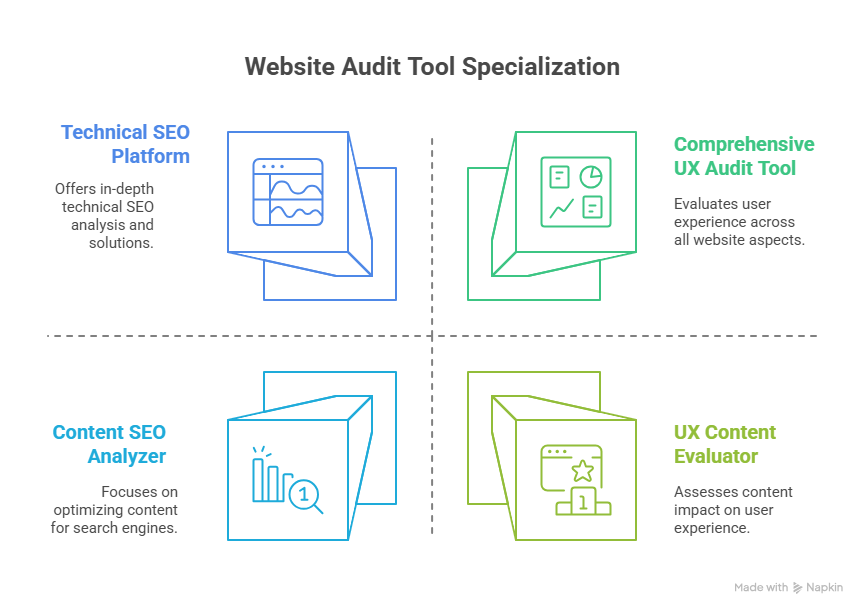Did you know that a staggering 75% of users judge a company’s credibility based on its online presence? A well-optimized site analysis tool can be the difference between a thriving online business and one that’s lost in the digital void.
In today’s competitive digital landscape, having a robust online presence is crucial. Website audit software is designed to help businesses like yours identify areas for improvement, optimize user experience, and boost search engine rankings.
By leveraging the power of site analysis tools, you can refine your online strategy, drive more traffic, and ultimately increase conversions. In this article, we’ll explore the ins and outs of website audit software and why it’s an essential tool for any business looking to succeed online.

Understanding Website Audit Software
In the digital landscape, website audit software emerges as a vital tool for website owners and marketers alike. It’s designed to analyze and improve a website’s overall performance, user experience, and search engine ranking.
Definition and Core Functions
Website audit software, also known as an seo audit tool, is a comprehensive solution that scans and evaluates a website’s structure, content, and technical aspects. Its core functions include identifying technical SEO issues, detecting broken links, and analyzing content quality.
By utilizing a website scanner, users can gain insights into their website’s strengths and weaknesses, allowing for data-driven decisions to enhance their online presence.
Types of Website Audit Tools
There are various types of website audit tools available, catering to different needs and budgets. Some tools specialize in technical SEO audits, while others focus on content analysis or user experience evaluation.
- Technical SEO audit tools
- Content analysis tools
- User experience evaluation tools
- Comprehensive website audit platforms

Choosing the right tool depends on your specific requirements and goals.
By understanding the different types of website audit software, you can make an informed decision and select the tool that best suits your needs.
Key Benefits of Using Website Audit Software
In today’s digital landscape, leveraging website audit software is crucial for identifying areas of improvement and optimizing your online presence. By utilizing such tools, you can significantly enhance your website’s overall performance and user experience.
Identifying Technical SEO Issues
One of the primary benefits of using an online audit generator is its ability to identify technical SEO issues that may be hindering your website’s visibility on search engines. These issues can range from broken links and crawl errors to improper header tag usage and slow page loading speeds. By pinpointing these problems, you can take corrective measures to improve your website’s search engine ranking.
- Crawl errors and broken links detection
- Header tag optimization suggestions
- Page loading speed analysis
Improving User Experience
A website health checker not only identifies technical issues but also provides insights into how to improve user experience. This includes recommendations for mobile-friendliness, site navigation, and content optimization. By enhancing these aspects, you can increase user engagement and reduce bounce rates.
Gaining Competitive Insights
Website audit software can also offer valuable competitive insights by analyzing your competitors’ websites and identifying gaps in the market. This information can be used to inform your SEO strategy and content creation, helping you to stay ahead of the competition.
- Competitor website analysis
- Market gap identification
- SEO strategy formulation
Enhancing Website Performance
Finally, using website audit software can lead to significant enhancements in website performance. By addressing issues such as slow loading speeds and optimizing images, you can improve your website’s overall efficiency and provide a better experience for your users.
By leveraging the insights and recommendations provided by website audit software, you can ensure that your website remains competitive, user-friendly, and optimized for search engines.
How to Choose the Right Website Audit Software for Your Needs
With numerous website audit tools available, choosing the right one requires a clear understanding of your website’s goals. Whether you’re looking to improve your site’s SEO, enhance user experience, or boost performance, the right software can make all the difference.
Assessing Your Website Goals
Before diving into the world of website audit software, it’s essential to define what you hope to achieve. Are you looking to identify technical SEO issues using an on-page SEO checker, or do you want to analyze your site’s overall performance with a website performance audit? Understanding your goals will help narrow down the features you need.
For instance, if your primary concern is improving your site’s loading speed, you’ll want software that can provide detailed insights into performance metrics. On the other hand, if you’re more focused on SEO, look for tools that offer comprehensive keyword analysis and backlink profiling.
Must-Have Features and Capabilities
Once you’ve identified your goals, it’s time to look at the features and capabilities of various website audit software. Some key features to consider include:
- Crawling and indexing analysis
- SEO audits with actionable recommendations
- User experience analysis, including mobile responsiveness
- Competitor analysis
- Integration with other SEO tools and platforms
An effective on-page SEO checker should be able to analyze your site’s structure, meta tags, and content quality, providing insights on how to improve your search engine rankings.
Budget Considerations
Budget is a critical factor when selecting website audit software. Prices can vary widely, from free tools with limited features to comprehensive suites that can cost several hundred dollars per month.
It’s crucial to balance your budget with the features you need. Consider whether you need a basic tool for occasional audits or a more advanced solution for ongoing monitoring and analysis.
Implementation and Learning Curve
Finally, consider the implementation process and the learning curve associated with the software. Some tools are designed to be user-friendly, with intuitive interfaces and straightforward reporting. Others may require more technical expertise, especially if you’re dealing with complex data analysis.
Look for software that offers good customer support, training resources, and perhaps even a free trial to test the waters before committing.
By carefully assessing your website goals, must-have features, budget, and the implementation process, you can choose the right website audit software to enhance your site’s performance and SEO.
Conclusion
Investing in a reliable website optimization tool is crucial for enhancing your website’s performance and driving success. As discussed, site audit software plays a vital role in identifying technical SEO issues, improving user experience, and gaining competitive insights.
By utilizing a comprehensive site audit software, you can significantly impact your website’s visibility, traffic, and overall online presence. These tools provide actionable recommendations to optimize your website, ensuring it meets the ever-evolving search engine algorithms and user expectations.
When selecting a website optimization tool, consider your website goals, must-have features, and budget. A well-chosen site audit software can streamline your optimization efforts, saving time and resources. By leveraging these tools, you can stay ahead of the competition and achieve your online objectives.
FAQ
What is website audit software, and how does it work?
Website audit software is a tool designed to analyze and evaluate the performance, structure, and content of a website. It works by crawling the website, identifying technical SEO issues, and providing recommendations for improvement, ultimately helping to enhance the website’s overall performance and user experience.
What are the benefits of using a site analysis tool?
Using a site analysis tool can help identify technical SEO issues, improve user experience, gain competitive insights, and enhance website performance. It provides a comprehensive understanding of a website’s strengths and weaknesses, enabling data-driven decisions to drive success.
How does an SEO audit tool help in improving website rankings?
An SEO audit tool helps identify and resolve technical SEO issues, such as broken links, duplicate content, and slow page loading speeds, which can negatively impact website rankings. By addressing these issues, a website can improve its visibility, drive more traffic, and increase its search engine rankings.
What is the difference between a website scanner and an online audit generator?
A website scanner is a tool that identifies technical issues on a website, such as broken links and malware, while an online audit generator provides a comprehensive analysis of a website’s performance, structure, and content, offering recommendations for improvement. Both tools are essential for maintaining a healthy and optimized website.
How can a website health checker improve my website’s performance?
A website health checker can identify issues that may be impacting a website’s performance, such as slow loading speeds, broken links, and poor mobile responsiveness. By addressing these issues, a website can improve its overall performance, enhance user experience, and drive more conversions.
What are the key features to look for in an on-page SEO checker?
When selecting an on-page SEO checker, look for features such as keyword analysis, meta tag optimization, header tag analysis, and content optimization recommendations. These features can help identify areas for improvement and provide actionable advice to enhance a website’s on-page SEO.
How does a website performance audit help in improving website speed?
A website performance audit identifies areas that may be impacting a website’s speed, such as large image files, poorly optimized code, and slow server response times. By addressing these issues, a website can improve its loading speed, enhancing user experience and driving more conversions.
What is the role of a website optimization tool in enhancing user experience?
A website optimization tool helps identify areas for improvement, such as poor mobile responsiveness, confusing navigation, and slow loading speeds. By addressing these issues, a website can enhance user experience, drive more conversions, and increase customer satisfaction.
How can site audit software help in gaining competitive insights?
Site audit software can provide competitive insights by analyzing a website’s performance, structure, and content, and comparing it to that of its competitors. This information can help identify areas for improvement and provide a competitive edge in the market.

